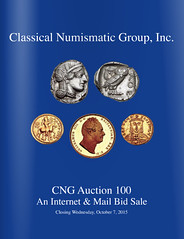
PREV ARTICLE
NEXT ARTICLE
FULL ISSUE
PREV FULL ISSUE
CLASSICAL NUMISMATIC GROUP SALE 100 CLOSES OCTOBER 7, 2015
Classical Numismatic Group also forwarded these press releases about the firm’s 100th Mail Bid Sale. Thanks. -Editor
The second catalog for CNG 100 is the firm’s annual autumn sale that features 1152 lots of ancient Greek, Celtic, Oriental Greek, Central Asian, Roman Provincial, Roman Republican, and Roman Imperial coinage. Additionally, there are featured selections of Byzantine, Early Medieval, Islamic, World Coinage & Medals, and British Coinage & Medals. The pre-sale estimate total for this part of CNG 100 is approximately $2.75 million. This promises to be one of the firm’s strongest mail bid sales to date. The catalog for CNG 100 opens with a brief history of the company as the firm celebrates its 40th year in business. The Greek section of CNG 100 is highlighted by a large number of pedigreed coins from the “Friend of a Scholar” collection, including coins from many important collections of the past such as BCD, Gans, Jameson, Knopke, Kunstfreund, Lockett, Nanteuil, Niggeler, Peyrefitte, Pozzi, Prospero, Rothschild, Seltman, Trampitsch, Virzi, and Vlasto. The sale also includes a comprehensive Kushan gold collection, further selections of Greek and Roman coinage from the R.H. Collection, rare Roman Alexandrian from the Syracuse Collection, Roman coins from the Olav E. Klingenberg Collection, further selections of Byzantine coinage from the Prue Morgan Fitts Collection, and a collection of exceptional milled English being sold anonymously. Some of the individual highlights from CNG 100 are: Greek Coinage 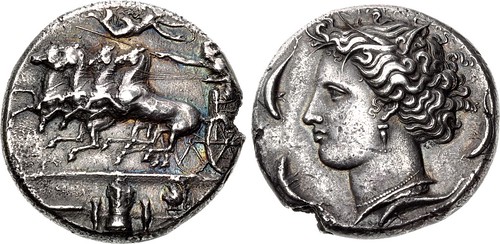
Lot 1288–SICILY, Syracuse. Dionysios I. 405-367 BC. AR Dekadrachm (35mm, 42.40 g, 1h). Reverse die signed by Euainetos. Struck circa 405-390 BC. Charioteer, holding kentron in extended right hand and reins in left, driving fast quadriga left; above, Nike flying right, crowning charioteer with wreath held in her extended hands; below heavy exergual line, [military harness], shield, greaves, cuirass, and crested Attic helmet, all connected by a horizontal spear; [AΘΛA below] / Head of Arethousa left, wearing wreath of grain ears, triple-pendant earring, and pearl necklace; ΣΥ-ΡΑΚ-Ο-ΣΙ-ΩΝ above (bottom of letters visible), four dolphins swimming around, and EY-A[IN]E along lower edge (top of letters visible). Gallatin dies R.VIII/C.XV, 3 = Nanteuil 360 (this coin); Rizzo pl. LIV, 6–7; SNG ANS 369; SNG Lloyd 1412; Dewing 896–7; BMC 175 (same dies); SNG München 1078 (same dies). Good VF, attractive gray toning with slight iridescence, only a hint of the usual die rust, faint marks under tone in field on obverse. Estimated at $50,000 From the Friend of a Scholar Collection. Ex Leu 38 (13 May 1986), lot 40; Henri de Nanteuil Collection (1925), 360; G. Picard Collection (Sambon, 14 March 1923), lot 344; Gustave Burel Collection (Feuardent, 11 June 1913), lot 95. Roman Republic 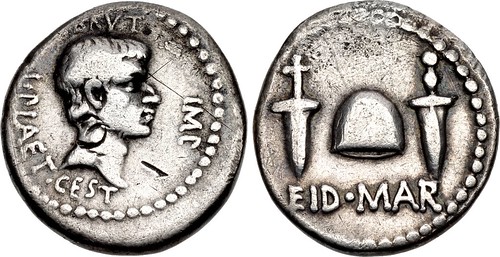
Lot 1823–The Republicans. Brutus. Late summer-autumn 42 BC. AR Denarius (17mm, 3.58 g, 12h). Military mint traveling with Brutus and Cassius in western Asia Minor or northern Greece; L. Plaetorius Cestianus, magistrate. Bare head of Brutus right; BRVT above, IMP to right, L • PLAET • CEST around to left / Pileus between two daggers pointing downward; EID • MAR below. Crawford 508/3; Cahn 20c (this coin); CRI 216; Sydenham 1301; Kestner –; BMCRR East 68-70; RSC 15; Mazzini 15 (this coin); RBW –. Good Fine, toned, bankers’ marks and a couple scratches on obverse under tone, areas of minor porosity and minor marks. Rare. Estimated at $50,000 Duplicate from the collection of M. A. Armstrong. Ex Numismatic Fine Arts XII (23 March 1983), lot 134; Giuseppe Mazzini Collection (Milan, 1957), 15. One of the most important coins associated with an event in ancient history, this denarius pointedly commemorates the assassination of Julius Caesar by depicting the perpetrator of the act (Brutus), by naming the date of the act (EID[ibus] MAR[tiis], by displaying the instruments of the act (daggers) between the reason for the act (the pileus [freedman’s cap] as a symbol of liberty). Though many senators plotted against Caesar and are collectively represented by the two daggers, the portrait of Brutus alone emphasizes his primary role in the conspiracy. The only securely identified portraits of Brutus occur on coins inscribed with his name; all others, whether on coins or other artifacts, are identified based on the three issues inscribed BRVTVS IMP (on aurei) or BRVT IMP (on denarii). A careful study of Brutus’ portraits by S. Nodelman segregates these inscribed portraits into three main categories: a ‘baroque’ style portrait on the aurei of Casca, a ‘neoclassical’ style on the aurei of Costa, and a ‘realistic’ style on the ‘EID MAR’ denarii, which Nodelman describes as “the soberest and most precise” of all. Byzantine Coinage 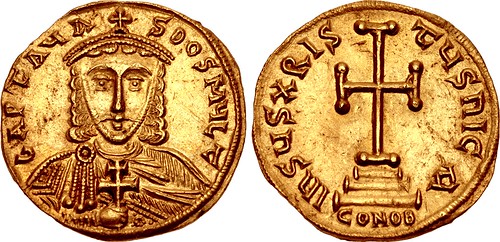
Lot 2041–Artavasdus. 741/2-743. AV Solidus (20mm, 4.46 g, 6h). Constantinople mint. Struck 741/2. 6 APτAЧA-SDOS MЧLτ, crowned facing bust, holding patriarchal cross / IhSЧS XRIS τЧS ҺICA, cross potent set on three steps; CONOB. DOC (1) = A. A. Boyce, “A Solidus of Artavasdus,” MN V, pp. 89-90, pl. XV, 1 = Füeg 1 (same dies); SB 1541. EF, scattered light marks. Extremely rare, perhaps the fourth known. The only example in CoinArchives (CNG 78 [14 May 2008], lot 1885) hammered for $42,000. Estimated at $30,000 Artavasdus was an able general who rose to prominence under Leo III and earned the hand of the emperor’s daughter Anna. A year after the death of Leo, he usurped the throne from his brother-in-law Constantine V. Artavasdus quickly raised his son Nicephorus to the rank of co-emperor, and most of the scant surviving coins from his reign feature a portrait of Nicephorus on the reverse. This exceptionally rare coin is from the usurper’s first issue, before the elevation of Nicephorus, and features the canonical cross potent on steps reverse. Artavasdus was an iconodule whose decision to restore the icons was well received by the populace. The reverse legend on this rare issue, IhSЧS XRISτЧS nICA, replacing the usual VICTORIA AVGЧ legend found on previous solidi of this type, achieves a different religious tone than had appeared on the gold issues of Leo and Constantine, and may have been chosen to appease a frustrated church and citizenry. World & British Coinage 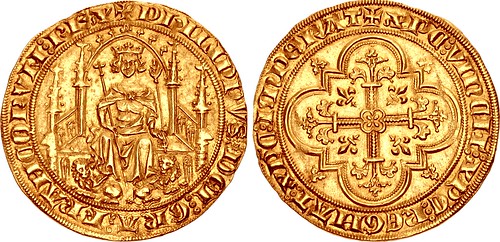
Lot 2140–FRANCE, Royal. Philippe VI de Valois (of Valois). 1328-1350. AV Parisis d’or (31mm, 7.04 g, 12h). Authorized 6 September 1329. + PҺILIPPVS · DЄI : GRA : FRAИCORVИ : REX, Philippe seated facing on elaborate gothic throne, holding scepter surmounted by Hand of Justice in left hand and lis-tipped scepter in right; lion crouching beside each foot; mullet flanked by annulets after PҺILIPPVS; triple annulet stops / + XP’C VInCIT XP’C RЄGИAT XP’C ImPЄRAT, cross fleurée over voided short cross potent, with voided quatrefoil at center and lis in each quarter; all within double polylobe, with trefoil at each spandrel; triple annulet stops. Duplessy 248; Ciani 268; Lafaurie 252; Friedberg 264. EF, rich pale blue and orange toning. Estimated at $40,000 From an early 20th century collection, with ticket in French labeled no. 342. Ex E. Gariel Collection (M. H. Hoffmann, 27 April 1885), lot 1593. “Stupor Mundi” 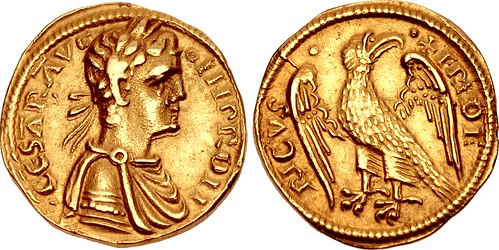
Lot 2197–ITALY, Sicilia (Regno). Federico I (Federico II, Sacro Romano Impero). 1198-1250. AV Mezzo Augustale (16mm, 2.62 g, 6h). Brindisi mint. Struck circa 1231-1250. CЄSAR AVG • IMP ROM, laureate, draped, and cuirassed bust right / •+FRIDE-RICVS•, eagle standing left, head right, with wings spread. Spahr 104; MEC 14, –. Near EF, toned, tiny flan crack. Very rare, much more so than the Augustale. Estimated at $15,000 Frederick II Hohenstaufen, “Stupor Mundi” (“Wonder of the World”), was the most enlightened ruler of the medieval European world, and single-handedly almost ignited a renaissance a century before it took hold in western Europe. Besides encouraging the study of both the ancient and natural worlds (he wrote an insightful treatise on falconry), Frederick was instrumental in improving relations with the Muslims, negotiating free access to Christian holy sites in Palestine, where all Crusader armies had been unsuccessful. One of his innovations was a gold coinage comparable in style and quality to the gold of the ancient Caesars. The classical motifs proclaimed his inheritance of the legacy of Rome, and the augustale and its fractions were issued concurrently with the publication of the Constitution of Melfi, his codification of Norman law meant to follow the famous Roman law codes. These coins were struck until Frederick's death in 1250, and may have been continued by his successors for about another fifteen years. NGC PF 64+ Ultra Cameo 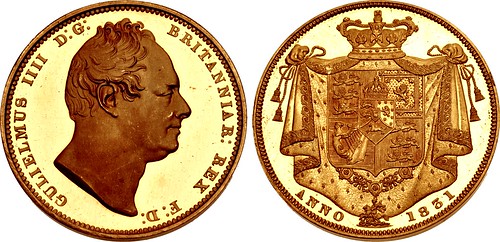
Lot 2324–HANOVER. William IV. 1830-1837. Proof AV Two Pounds (28mm, 15.86 g, 5h). London mint. Dated 1831. Bare head right / Crowned and mantled coat-of-arms with Collar of the Order of the Garter. W&R 258; MCE –; SCBC 3828. In NGC encapsulation graded PF 64+ Ultra Cameo. A most handsome coin. Estimated at $10,000 Printed catalogs for CNG 100 are now available. To order both catalogs (Adams Collection–Part I and the regular CNG 100 catalog), please visit www.cngcoins.com. The two catalogs are $75 postpaid to North American addresses, and $100 to the rest of the world. Payment may be made by U.S. $ check or Visa/MasterCard. Catalogues have been mailed to customers on CNG’s active mailing list. Prospective bidders may also view the virtual catalogs at CNG 100 Virtual Catalog and CNG 100 - Adams Collection Virtual Catalog. The sale can be viewed online at cngcoins.com, sixbid.com and numisbids.com. In addition to Internet & Mail Bid Sale 100, CNG will also feature over 1100 lots from many of the same collections listed above in their Electronic Auction 361, closing a week later on Wednesday, October 14, 2015, from 10AM ET (U.S.). Bidding for CNG Electronic Auction 361 will begin on October 1, 2015. CNG is currently accepting consignments for future auctions sales. Please contact the firm for further details and consignment deadlines. For further details and any additional information, please contact CNG, Inc. at: Classical Numismatic Group, Inc.
Wayne Homren, Editor The Numismatic Bibliomania Society is a non-profit organization promoting numismatic literature. See our web site at coinbooks.org. To submit items for publication in The E-Sylum, write to the Editor at this address: whomren@gmail.com To subscribe go to: https://my.binhost.com/lists/listinfo/esylum All Rights Reserved. NBS Home Page Contact the NBS webmaster 
|
